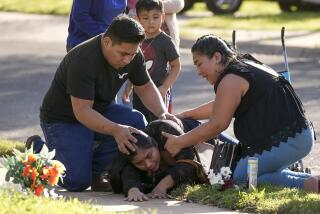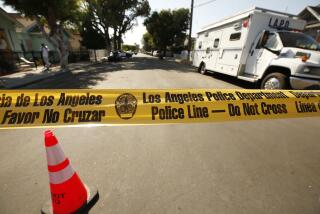Tables turn quickly in raids
- Share via
BAGHDAD — The U.S.-led convoy had been idling for at least an hour, waiting for a bomb squad to detonate a sizable haul of explosives uncovered in raids on the Iskan neighborhood of south Baghdad, a dense warren of narrow streets teeming with Sunni insurgents and roadside bombs.
It had been a successful morning: The U.S. forces, working alongside Iraqi national police, had detained 10 men in raids on the homes of suspected insurgents and had uncovered a homemade rocket launcher, two rifles and a cache of mortar rounds.
Then there was an explosion, but not the one they were waiting for: The convoy was under attack.
Snipers had thrown a grenade, which was followed by the loud, rapid hammer of automatic weapons fire from a rooftop and from behind a fuel tank. American and Iraqi soldiers took and returned fire. No one was hit, and the snipers melted back into the neighborhood.
So went another typical day in the U.S.-Iraqi security crackdown against an unseen enemy.
As the forces try to restore calm to the Iraqi capital, they have moved largely without incident into neighborhoods dominated by Shiite Muslim extremists whose leaders are allies of the Shiite-dominated Iraqi government.
But in districts dominated by Sunni Arab insurgents and their foreign compatriots, the U.S.-led forces are facing a much larger and bloody challenge.
The Iskan neighborhood and the larger Dora district may be the biggest stronghold of the Al Qaeda in Iraq network in Baghdad, and U.S.-led forces seeking to bring order are regularly coming under attack here. The troops of the Army’s 2nd Brigade, 12th Infantry Regiment, from Ft. Carson, Colo., search for insurgents and weapons with information provided to the Iraqi national police by detainees and informants.
The Shiite-dominated police are a fledgling, and some might say ragtag, force. They wear mismatched uniforms, and not all have boots. Still, U.S. soldiers give them high marks for obtaining quality intelligence.
*
Off to an early start
For the more than 30 American soldiers assigned to enter Iskan on Sunday, the day began when they rolled out of Forward Operating Base Falcon, a few miles south, at 3 a.m. Their goal was to capture a highly sought sniper who had been wounded in a previous gun battle with U.S.-led forces and to search for hidden caches of weapons.
The plan was to meet their Iraqi counterparts at their base and begin the raids by 4 a.m., while still under the cover of darkness. Once at the Iraqi national police outpost, however, there were other priorities.
The Iraqi officers invited the Americans to join them for a breakfast of tea, flatbread and hard-boiled eggs. The informants, who were brought in to review maps and confirm targets, disagreed on locations. The original plan was mostly scrapped, in favor of fewer targets. As a result, the U.S. asked the Iraqis to reduce the size of their force, but they demurred. By then it was nearly 5 a.m.
After a slow crawl into the crowded neighborhood, the convoy stopped and the soldiers jumped down from their Humvees, running low and fast through the street. They raided two homes, separating the wailing women and girls from the frightened and silent men and boys.
No weapons were found in either household and the occupants insisted they had done nothing wrong. In one of the houses, a soldier found a portrait of former Iraqi President Saddam Hussein, which he threw on the floor. They also found multiple fake identification cards for one man.
A witness identified two men in one of the houses as insurgents; they were blindfolded, zip-cuffed and placed in the back of an Iraqi national police truck. Through an interpreter, a soldier asked a young boy what his older brother did for a living. “He digs in the road,” was the reply.
Two men were taken from the home across the road as well.
When the sun came up, it was on to the sniper’s house. He wasn’t there, but he seemed to have known they were coming. About 10 minutes before the soldiers arrived, he called a friend who was staying there and told him to run. Now the man was hopping fences and scrambling through yards trying to escape.
Soldiers caught him outside a house around the block. He claimed he lived there, but the occupants denied it.
He was taken back to the other house, in the hopes he could lure the sniper back by calling him on his cellphone and telling him it was safe to return. The man vomited at the thought and refused to cooperate.
The U.S. and Iraqi forces then tried to force the information from him.
*
‘Good cop, bad cop’ time
“He needs to tell me something, or I will walk up and down the street with him until someone shoots him,” the leader of the squad, Capt. Joseph Schwankhaus, said through the interpreter.
“I can’t help,” the man replied. “They will kill me.”
Schwankhaus tried to get the Iraqi officers to help.
“We gotta explain something to you, ‘Good cop, bad cop,’ ” he said to his Iraqi counterpart. “You should be standing here, saying you’re going to beat him to death and cut off his fingers.”
Still no dice. The man was blindfolded and put in the truck.
Meanwhile, Iraqi police officers dug up more than two dozen mortars rounds they found buried in the flowerbed of the abandoned house next door.
Not long after, a U.S. soldier found the rocket launcher on the sniper’s roof, and still another found two rifles, wrapped in cloth and plastic, hidden under a pile of bricks.
*
‘Fire in the hole!’
Now it was fully daylight, and time to move on to other targets. But soldiers found another cache of homemade explosive powder, propane tanks and a detonator, and decided to call the bomb squad to detonate the materiel on-site. Thus began the interminable wait, with the convoy idling on an access road.
Some of the soldiers were nodding off when the grenade exploded; suddenly, it seemed, there was gunfire everywhere. Pfc. Vincent Rabago, a 21-year-old Humvee gunner from Long Beach, wheeled in his turret to fire, but his mounted machine gun jammed. He picked up his M-4 rifle and began shooting. Just as suddenly as it began, the attack was over. Helicopters were called in but saw nothing.
First Sgt. Jim Naughton, the second in command of the group, issued an order.
“Anybody on a rooftop is [going] down,” he said. “I’ll bet you anything” that’s the sniper.
More time passed. Finally the bomb squad arrived. They packed the explosives into an abandoned house and told the convoy and the helicopters above to move away.
“Fire in the hole!” came the call over the radio. The deafening explosion demolished the house.
It was finally time to go. But one of the Humvees had a flat tire. Time seemed to slow to a crawl again, as the soldiers changed the tire, fully exposed to the neighborhood.
As the troops finally drove off, automatic gunfire cracked through the air again. No one could see where it was coming from.
Back at the Iraqi police station, soldiers focused on the solid haul of evidence and the lack of casualties. Some said they were impressed with the Iraqi officers’ efforts.
“They found more stuff than we did,” said Staff Sgt. Joseph Staver of Grayslake, Ill. “Those dudes can sniff out anything that’s out there. If there is a cache out there they can find it.”
For others, thoughts turned to memories of home. Spc. Peter Medina, 21, of San Pedro thought of his wife and 1-year-old child, and good Mexican food and In-N-Out burgers.
“I’m just counting the days till I get back,” he said.
*
More to Read
Sign up for Essential California
The most important California stories and recommendations in your inbox every morning.
You may occasionally receive promotional content from the Los Angeles Times.










